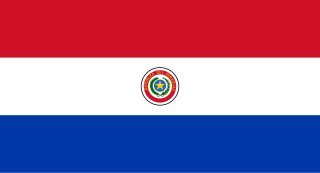
Paraguay competed at the 2004 Summer Olympics in Athens, Greece, from 13 to 29 August 2004. This was the nation's ninth appearance at the Olympics, except the 1980 Summer Olympics in Moscow because of its partial support to the United States boycott.

Italy competed at the 2000 Summer Olympics in Sydney, Australia. 361 competitors, 246 men and 115 women, took part in 175 events in 29 sports.

Finland competed at the 1960 Summer Olympics in Rome, Italy. 117 competitors, 107 men and 10 women, took part in 92 events in 14 sports.

Romania competed at the 1960 Summer Olympics in Rome, Italy. 98 competitors, 82 men and 16 women, took part in 65 events in 13 sports.

Peru competed at the 1960 Summer Olympics in Rome, Italy. 31 competitors, all men, took part in 8 events in 3 sports. Peru returned to the football tournament once more after the controversial 1936 Olympics. Most of the athletes that represented Peru were part of the football squad. Peru also participated in shooting and rowing events.

Australia competed at the 1960 Summer Olympics in Rome, Italy. 189 competitors, 160 men and 29 women, took part in 122 events in 17 sports. Australian athletes have competed in every Summer Olympic Games.

Argentina at the 1948 Summer Olympics in London, England was the nation's eighth appearance out of eleven editions of the Summer Olympic Games. Argentina sent to the 1948 Summer Olympics its fifth national team, under the auspices of the Argentine Olympic Committee of 199 athletes who competed in 101 events in 16 sports. It would not be until the 2016 Summer Olympics that the athlete delegation were surpassed. The medals haul of 3 golds, 3 silvers, and a bronze tied the medals haul in 1928. The achievement of 7 medals in an edition of the Olympics has yet to be matched.

Argentina at the 1928 Summer Olympics in Amsterdam, Netherlands was the nation's fifth appearance out of eight editions of the Summer Olympic Games. Argentina sent to the 1928 Summer Olympics its second national team, under the auspices of the Argentine Olympic Committee, 81 athletes that competed in 41 events in 12 sports. Argentina competed in equestrian, football, sailing, water polo, and wrestling for the first time. Argentina won 3 gold medals, its first Olympic championships in boxing and swimming. The team also won its first medals in fencing and football.

Athletes from the Federal People's Republic of Yugoslavia competed at the 1960 Summer Olympics in Rome, Italy. 116 competitors, 107 men and 9 women, took part in 64 events in 14 sports.

Austria competed at the 1960 Summer Olympics in Rome, Italy. 103 competitors, 82 men and 21 women, took part in 81 events in 15 sports.

Czechoslovakia competed at the 1960 Summer Olympics in Rome, Italy. 116 competitors, 99 men and 17 women, took part in 75 events in 13 sports.

Poland competed at the 1960 Summer Olympics in Rome, Italy. 185 competitors, 156 men and 29 women, took part in 108 events in 17 sports.

The Union of South Africa competed at the 1960 Summer Olympics in Rome, Italy. 55 competitors, 53 men and 2 women, took part in 46 events in 12 sports. After these Olympics, the International Olympic Committee banned South Africa from the Olympic Movement over the policy of apartheid, making these the last Olympics at which South Africa would compete until the repeal of apartheid and the 1992 Summer Olympics in Barcelona, Spain.

Japan competed at the 1960 Summer Olympics in Rome, Italy. 162 competitors, 142 men and 20 women, took part in 96 events in 17 sports. As the country hosted the next Olympics in Tokyo, the Japanese flag was raised at the closing ceremony.

Mexico competed at the 1960 Summer Olympics in Rome, Italy. 69 competitors, 63 men and 6 women, took part in 54 events in 14 sports.

Brazil competed at the 1952 Summer Olympics in Helsinki, Finland. 97 competitors, 92 men and 5 women, took part in 51 events in 14 sports. Brazil won three medals at the 1952 Summer Olympics. Brazil won its first gold medal since its debut at the 1920 Summer Olympics.

Brazil competed at the 1960 Summer Olympics in Rome, Italy. 72 competitors, 71 men and 1 woman, took part in 35 events in 14 sports. Brazilians obtained two bronze medals in Rome. The swimmer Manuel dos Santos was a bronze medalist in men's 100 metre freestyle. The men's basketball team also won the bronze medal. Flagbearer and defending two-time Olympic champion Adhemar Ferreira da Silva could not repeat his performance and placed fourteenth in the triple jump,

Rowing at the 1960 Summer Olympics featured 7 events, for men only. The competitions were held from 30 August to 3 September on the Lago di Albano.

Argentina competed at the 2016 Summer Paralympics in Rio de Janeiro, Brazil, from 7 to 18 September 2016. Wheelchair tennis player Gustavo Fernandez has been chosen to carry the nation's flag at the opening ceremony.

The men's eight competition at the 1960 Summer Olympics took place at took place at Lake Albano, Italy. It was held from 31 August to 3 September. There were 14 boats from 14 nations, with each nation limited to a single boat in the event. The event was won by the United Team of Germany in that combined team's debut; it was the first medal for any German team since the 1936 Games in Berlin and first-ever gold medal in the event for a German team. Canada repeated as silver medalists. Czechoslovakia won its first men's eight medal with a bronze. The United States, which had won the last eight times the event was held and all ten times the nation had appeared before, lost for the first time—finishing fifth, off the podium entirely, despite being among the contenders once again.

















